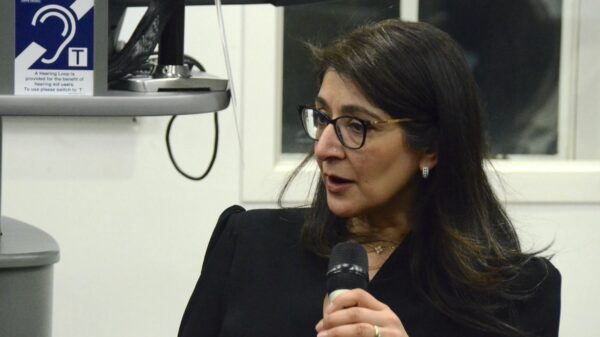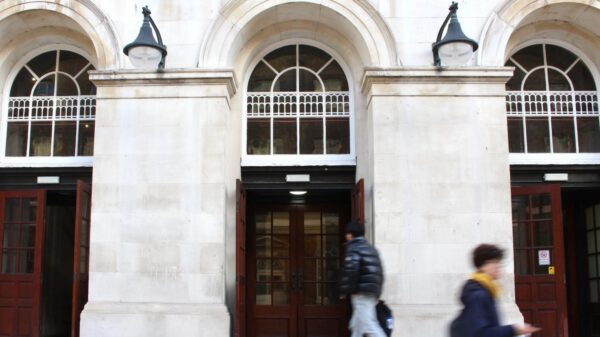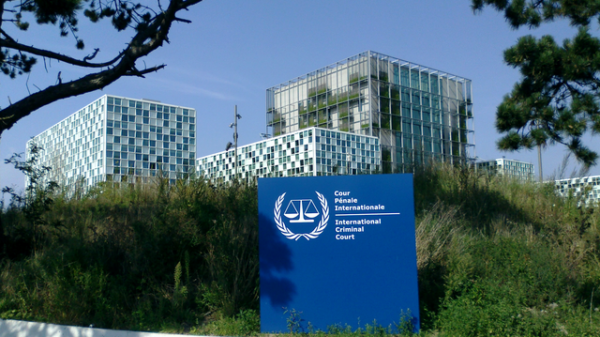News Editor Kayla Rahaman spoke with Lizzie Greenwood, a long-time pro-Palestine activist who maintained a 35-day hunger strike to protest the UK’s remaining arms licenses to Israel.
Editor’s note: Heavily restricting caloric intake can severely compromise one’s physical and mental health, very potentially with fatal consequences.
In October, Greenwood resorted to what she regarded as a necessary escalation of her protest against the UK’s role in the conflict: starting a hunger strike.
Though she paused in early December, I spoke with Greenwood on day 18 of her hunger strike. Asking how she was holding up, she admitted to being exhausted, struggling with brain function and experiencing stomach and body pains.
Yet, she was quick to reflect that her suffering—besides bringing attention to the reality of starvation—was minimal compared to what people in Gaza have no choice but to endure. On top of the symptoms she was experiencing, ‘they’re [Palestinians] also just being constantly displaced and moved around. They’re being bombed. They’re being shot at. They’re grieving and they’re constantly desperately on the search for food as well.’
The decision to go on a hunger strike
“My advice to anyone who is giving me advice is: if you have an idea or something that you think would be as or more effective, then don’t tell me. Do it. Go and do it yourself.”
Greenwood was a Palestine activist before the current war. In conversation, it is clear that a strong sense of anguish fuels her commitment to the movement. She told me of her memories standing in a room filled with Palestinians who, even before 7 October 2023, have had their homes destroyed, families killed and fathers sent away in prison for their entire lives. This year, those individuals lost as many as thirty family members and had their childhood hometowns decimated.
Their personal stories stressed urgency upon Greenwood: “all of these things just [keep] hammering home my responsibility and my duty as a person to just keep fighting.”
Prior to beginning her hunger strike, Greenwood engaged in ‘basically every avenue’ of pro-Palestine activism. She has attended demonstrations and engaged the issue through local political channels through writing, calling and visiting her MP’s office. In the last UK General Election, she ran as a Workers’ Party candidate in Withington, Manchester.
Greenwood told me that, in October, it was “time to reach towards more extreme and visceral forms of resistance.” By that point, the number of casualties reported in the Gaza Strip was over 41,000. Since September, Lebanese casualties have reportedly exceeded 3,000.
She also suggested her Manchester heritage, which saw the birth of the British Suffragette Movement and the employment of starvation as a protest tactic, probably made it “inevitable that I would go down the hunger strike route.”
Greenwood noted that many people question whether she considered alternative forms of activism, before deciding to resort to a hunger strike. She adamantly advised those who recommend other forms of protest to “Go and do it yourself.”
Working with the Holocaust Educational Trust
In College, Greenwood wrote about how the Holocaust impacted the world for an essay competition. Her essay won and she was selected as her school’s Youth Ambassador to the Holocaust Educational Trust. In this role, she met Holocaust survivors and visited the concentration camps in Poland. This was part of an effort to deepen education about the atrocities and recognise ‘warning signs’ of similar violence in future generations.
Greenwood felt the parallels between the Holocaust and the last few years have been ‘surreal’, especially in the ways she sees people “justifying [conditions in Palestine] and letting it happen.” She also expressed that, in conversation with many Jewish people who are descendants of Holocaust survivors, she discovered a shared willingness to label the treatment of Palestinians a holocaust.
‘The Holocaust’ has a universal connotation for the ‘systematic, state-sponsored persecution and murder of six million European Jews by the Nazi regime and its allies and collaborators’ between 1933 and 1945. The word ‘holocaust’ itself derives from the Greek term for ‘sacrifice by fire’ and can be used to describe a mass-scale killing of people. Greenwood argued that a holocaust is about “the element of intention” and that the Israeli government’s intentions towards Palestinians have been openly genocidal.
When I asked her about Sir Keir Starmer’s speech at the Trust in September 2024, she criticised the Prime Minister for being “hypocritical and self-serving” in stressing the importance of teaching about the Holocaust while showing “unwillingness to acknowledge [the current War in Gaza] for what it is.”
She argued that a big part of the issue is that while education against Anti-Semitism has been positively promoted in UK institutions, similar curricula are not strongly established to dismantle Islamophobic tropes.
Not all Palestinians are Muslim, but there can be overlap in manifestations of anti-Arab and anti-Muslim sentiment. Greenwood pointed out how problematic at a “very basic level” this disparity of education about different types of bigotry is on a larger social scale, citing the wider impact of individuals like Nigel Farage and Tommy Robinson.
What’s Britain got to do with it?
“I just don’t think [my life] is more important than the life of hundreds of and thousands of Palestinians or Lebanese people.”
Some might critique that Greenwood’s activism, as a British person, is comfortably removed from the conditions in the Levant. This made me especially curious to learn more about her motivation to resort to the extremely perilous action of going on a hunger strike for Palestine specifically.
Greenwood expressed a deeper sense of humanity that goes beyond nationality, telling me “…honestly, I got to a point where I felt like this is the one thing I have left to fight with, you know, is my life and body. And I just don’t think it’s of more importance than the life of hundreds and thousands of Palestinians or Lebanese people.”
Furthermore, despite not being Palestinian herself, she framed these atrocities as being “a British problem.”
Her foremost grievance was the UK’s historic role in establishing the State of Israel and present arming of what she—and, recently, Amnesty International—describe as genocide against the people of Gaza by the Israeli government and military. In 1917, the British Empire promised to support the creation of a Jewish State in the British Mandate of Palestine. In 1948, the State of Israel was declared: the mass expulsion of native Palestinians from their ancestral homes in the same year is commonly known as the nakba, or ‘catastrophe’, in Arabic.
Some would say that, 75 years later, the nakba never truly ended due to Israel’s continued backing by Western nations and the international system amidst occupation and displacement of Palestinians. As a British citizen, Greenwood therefore feels she is especially responsible for pushing back against her country’s military support for Israel.
She also placed opposition to UK arms funding in terms of domestic British politics, expressed during her Parliamentary election bid. She ran for MP in Withington as a foil of incumbent Jeff Smith, who abstained from voting on the SNP ceasefire amendment in November 2023.
She told me that she wanted to not only give people an anti-war and pro-Palestine choice, but also a candidate who wanted to reallocate money going to overseas war “back into English communities.” Making special note of the UK’s deep child poverty crisis, she viewed the arms licenses as diverting direct government support away from British citizens: “All that money, all those resources that are going to Israel could be going into the UK…all the money that we spend on overseas war is money that is not getting spent within the UK.”
The UK government does not directly send funds to Israel, however the total value of arms export licenses granted to private firms reached £42mn in 2022.
The UK’s Remaining Arms Licenses
The UK Government announced the suspension of 30 out of approximately 350 arms licenses to Israel in September 2024. All military exports are subject to the UK’s strategic export licencing criteria, which obliges the government to reject licence applications if there arises a ‘clear risk that the items might be used to commit or facilitate a serious violation of international humanitarian law.’
Proceedings into the remaining arms exports are ongoing, with supportive organisations seeking to fully terminate arms exports to Israel.
The UK has imposed arms embargoes on Israel in the past. Edward Heath imposed embargoes on both Israel and its Arab rivals during the 1973 War. Margaret Thatcher diverted from Reagan’s ‘unlimited support’ during the 1983 Lebanon War and only lifted the embargoes in 1994. Tony Blair and Gordon Brown imposed (initially) secret embargoes. Under David Cameron in 2014, a partial suspension of arms exports to Israel was announced following Israel’s military operations in Gaza.
In 2022, less than 1% of Israel’s defence imports were estimated to come from the UK. Despite the UK’s relatively minimal role in the current landscape of military aid to Israel, especially compared to the United States, Germany and Italy, Greenwood remained adamant that “Any percentage of support is unacceptable.” She regarded the 10% suspension of arms licenses as especially insufficient because it excludes the F-35 fighter jet programme.
I asked her to respond to the Foreign Secretary’s comment that the F-35 programme held strategic importance for NATO and global security. She believed that these were simply “statements of appeasement” and that overall evidence from direct action groups breaking into factories has revealed “we are directly contributing to the war.”
On the impact that a hypothetical full UK arms embargo on Israel would have, Greenwood believed it would be one step toward Israel’s international accountability and the prevention of further escalations of violence.
There was also an anti-establishment bend to her view. She believed that these actions add up and that “You have to chip away at the war machine piece by piece.”
Ending the Strike
In early December, two weeks after I spoke with her, Greenwood decided to end her strike. By that time, she had been protesting for 35 days. Even by day 18 she was struggling.
Towards the end of our conversation, I asked her how she would explain the greater widespread popular advocacy for Palestinian self-determination and freedom. It is one of many wars this year generating severe human suffering.
Greenwood was about to take up this discussion before admitting she was, at this point, extremely exhausted and had to be careful because by day 18 she had “very limited time.”
Respecting this, I wondered under what conditions she would end the strike. As elsewhere, she affirmed that this was “a cause I’m willing to die for.” In late November, she was admitted to the hospital.
Before this, she also expressed to me that if she felt that she has truly made a powerful statement, or that “something has changed tangibly or it has at least got out there and regular British people are being impacted by it”, it might be enough for her to end the strike.
Indeed, her hunger strike gained international media attention while it was ongoing. While she has currently paused this form of protest, Lizzie Greenwood’s hunger strike is now counted amongst other pro-Palestine demonstrators who employed similar tactics from Jordan to Princeton University.
Before ending our lengthy conversation, I finally asked Greenwood how she would advise people continuing to engage in pro-Palestine activism. In a word: “Escalate.”
To those who have not been involved in Palestine activism, she encourages that “the second best time [to act] is now. It’s not too late…We want you, we need you.”
To those who have been engaged for some time, she concluded: “Just keep the hope alive, keep acting.”
You can follow Lizzie Greenwood’s Instagram here.


















